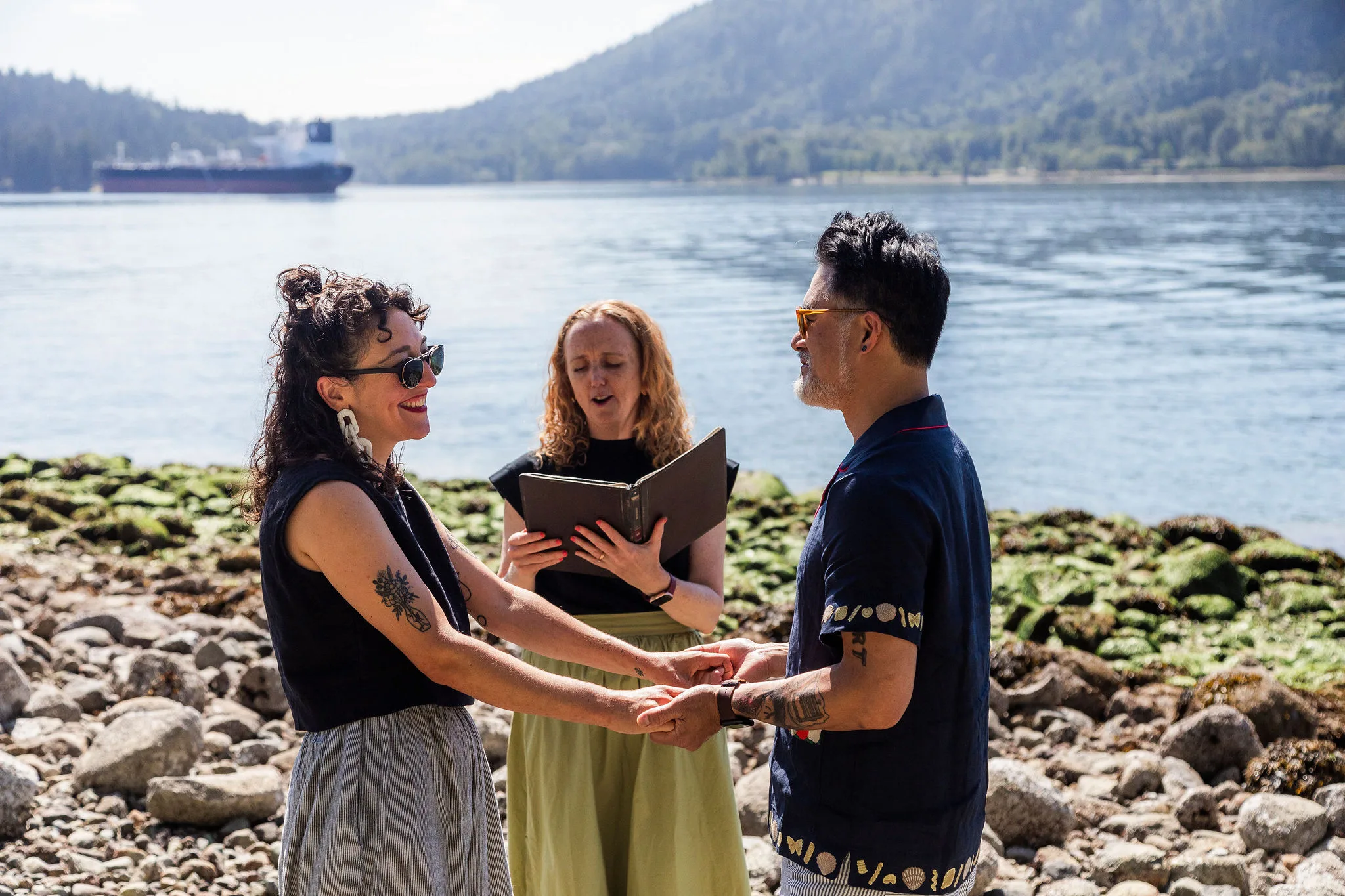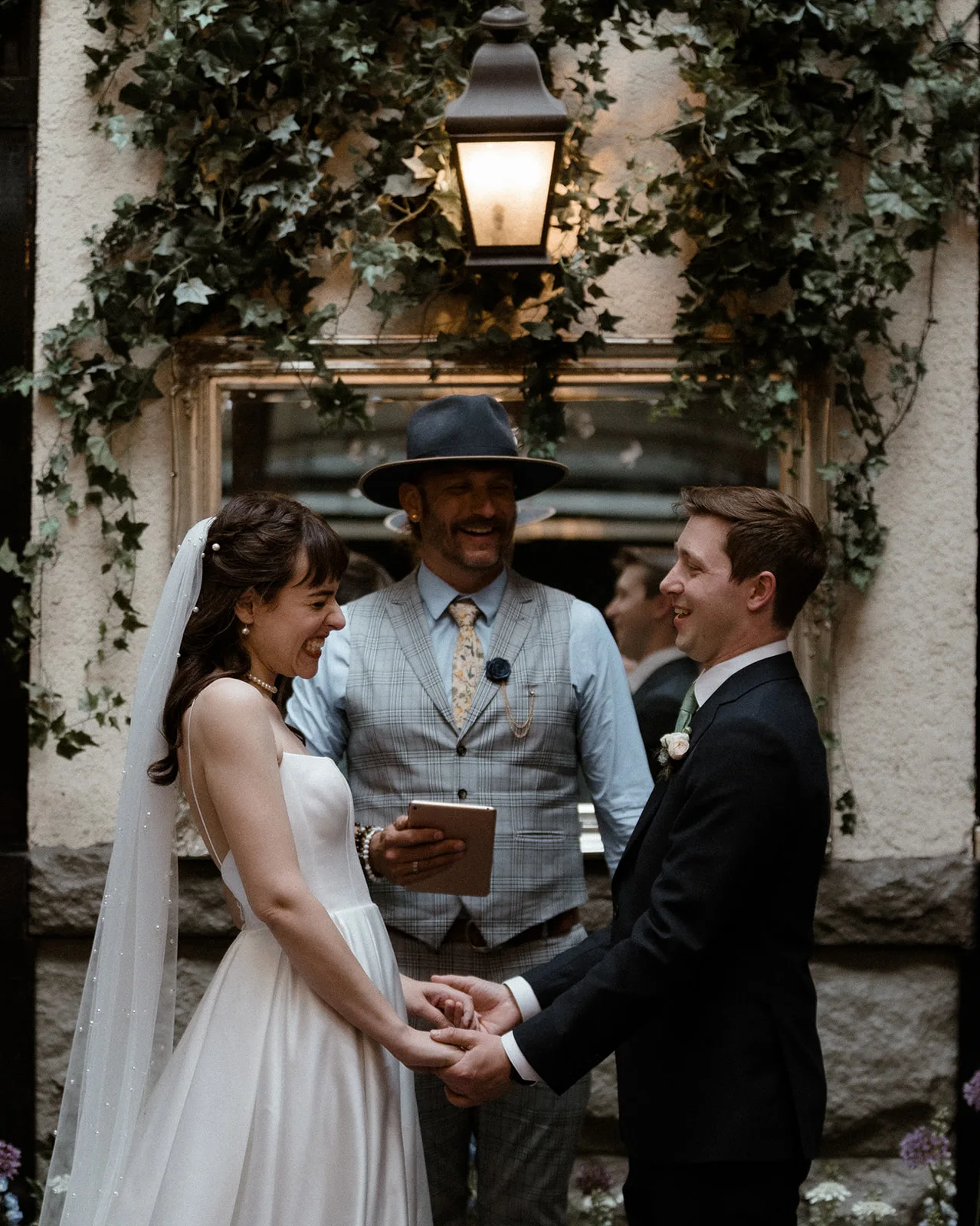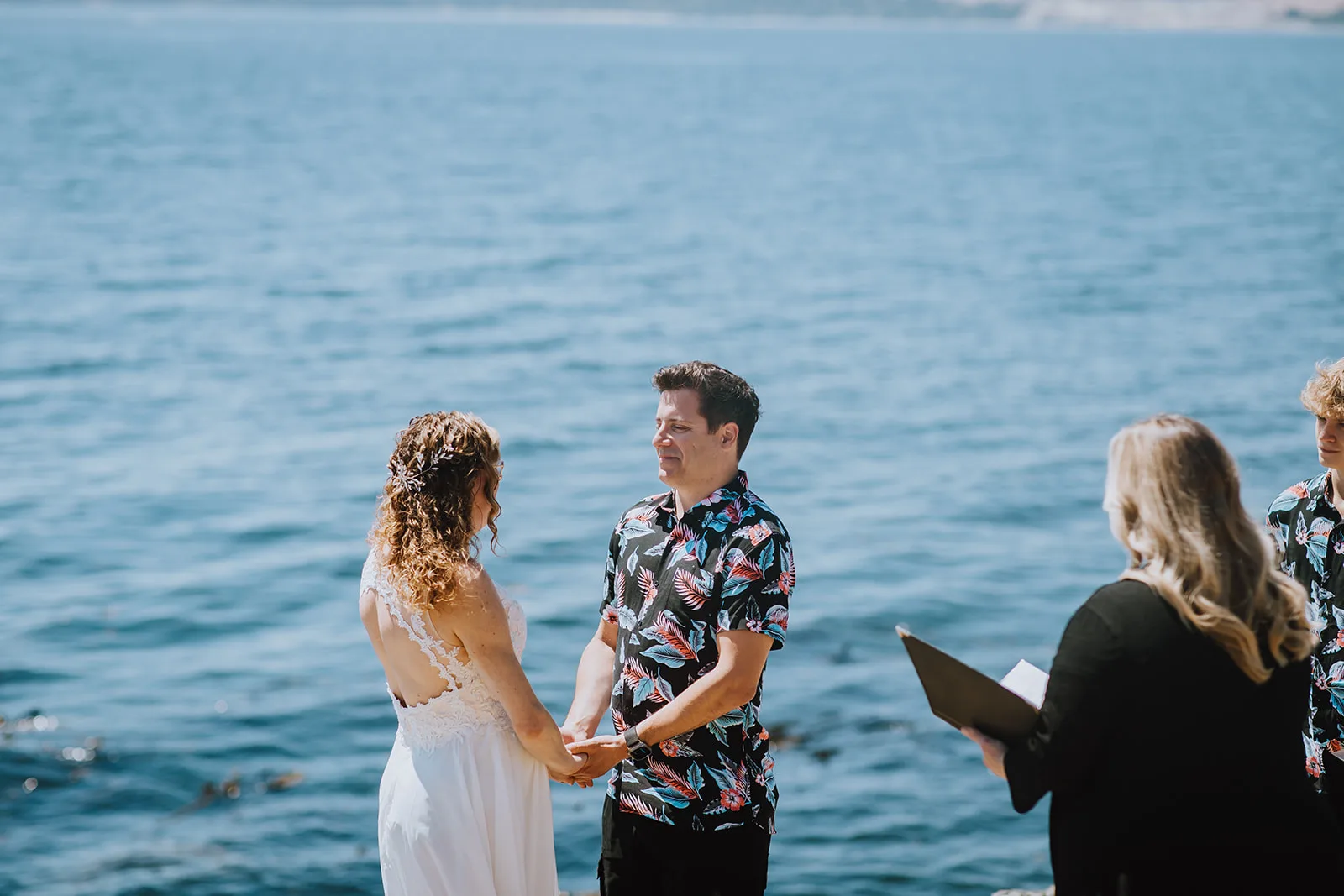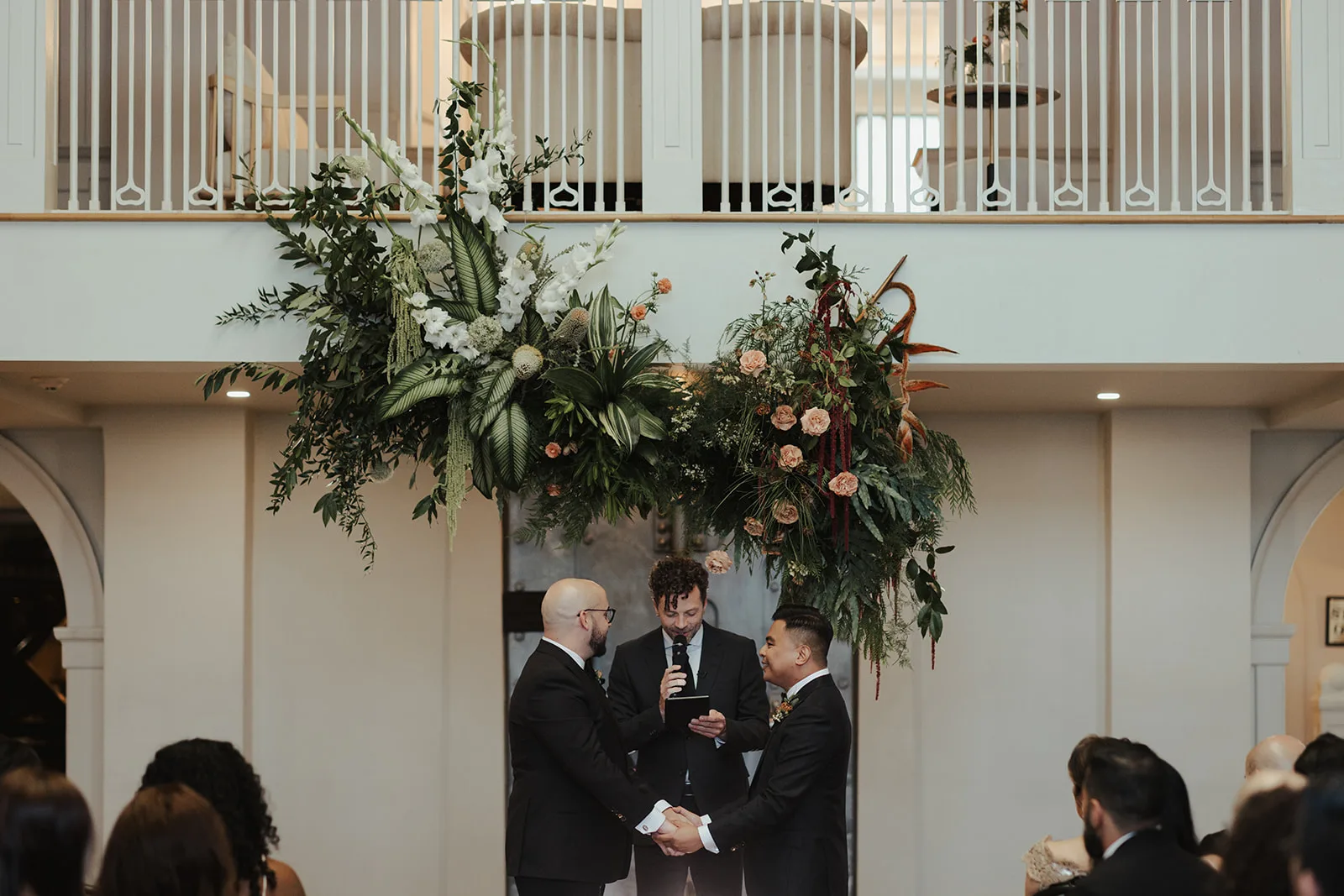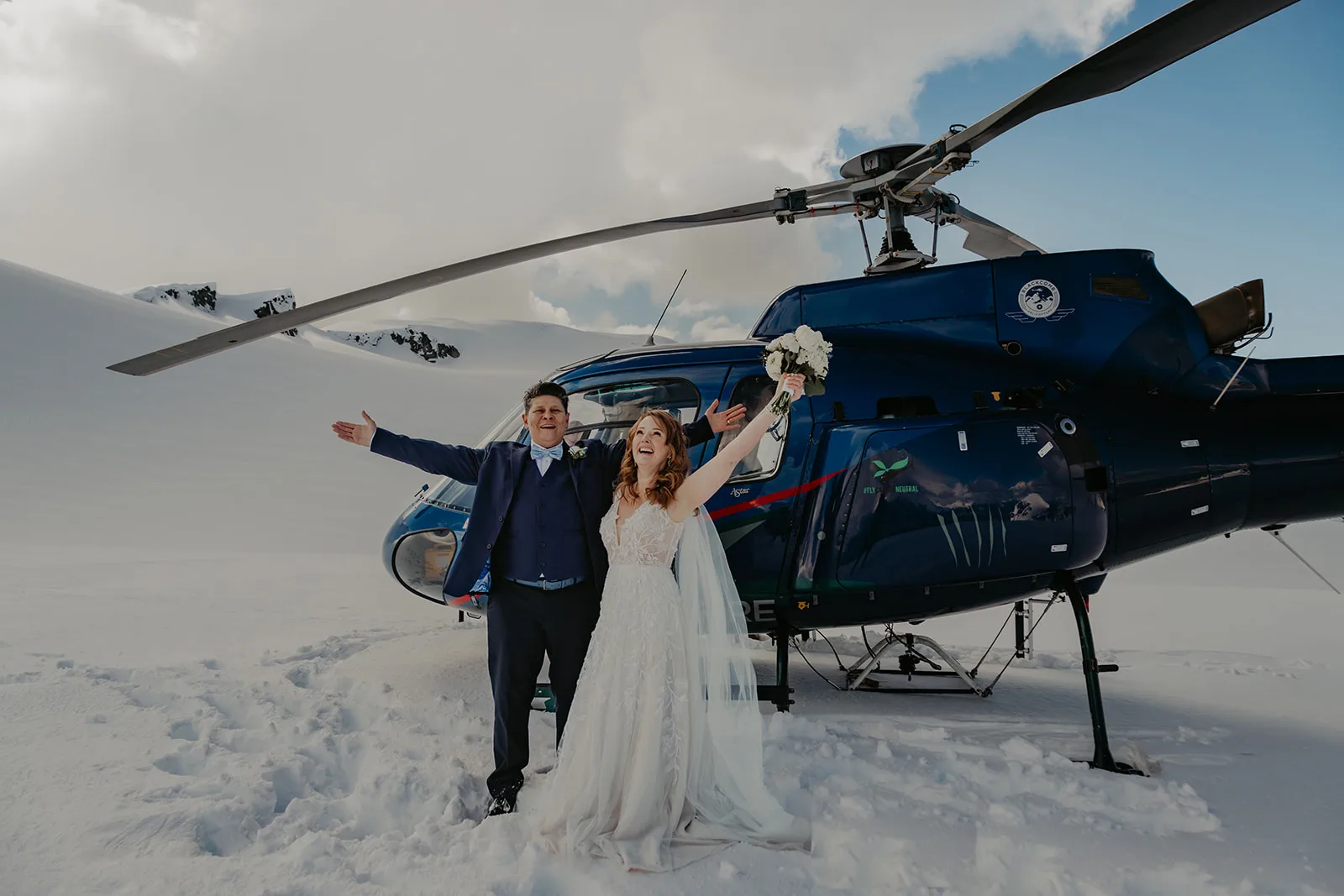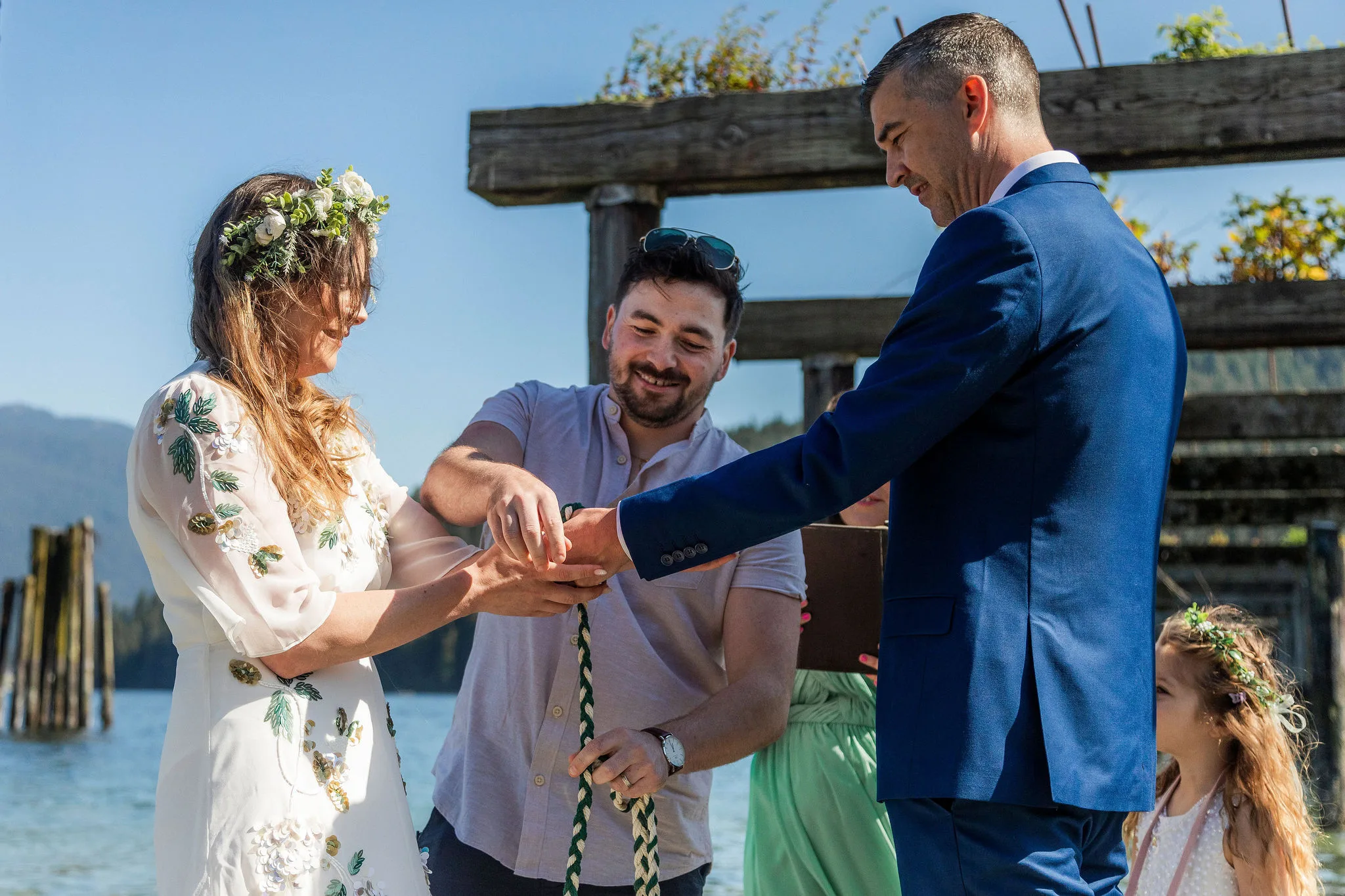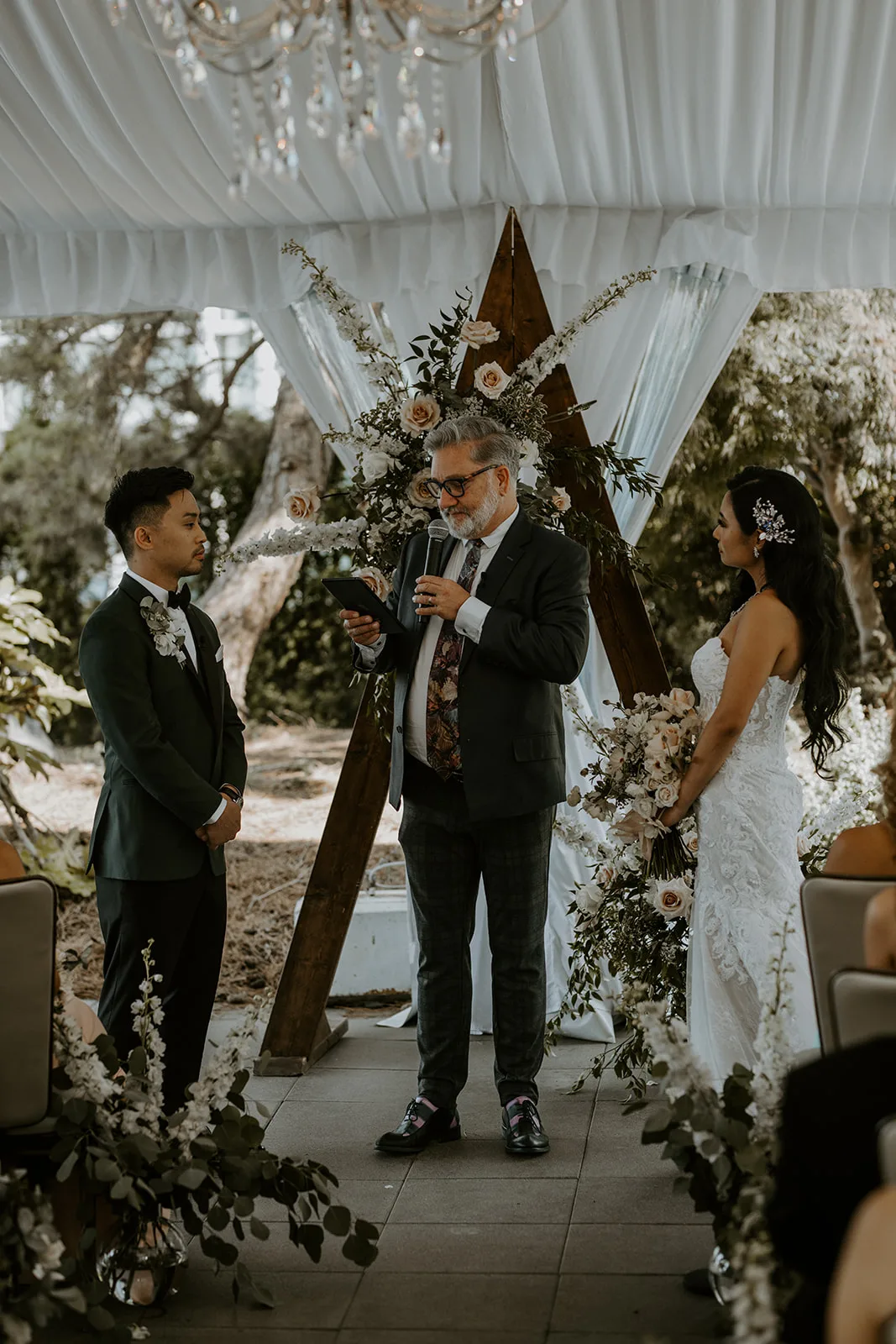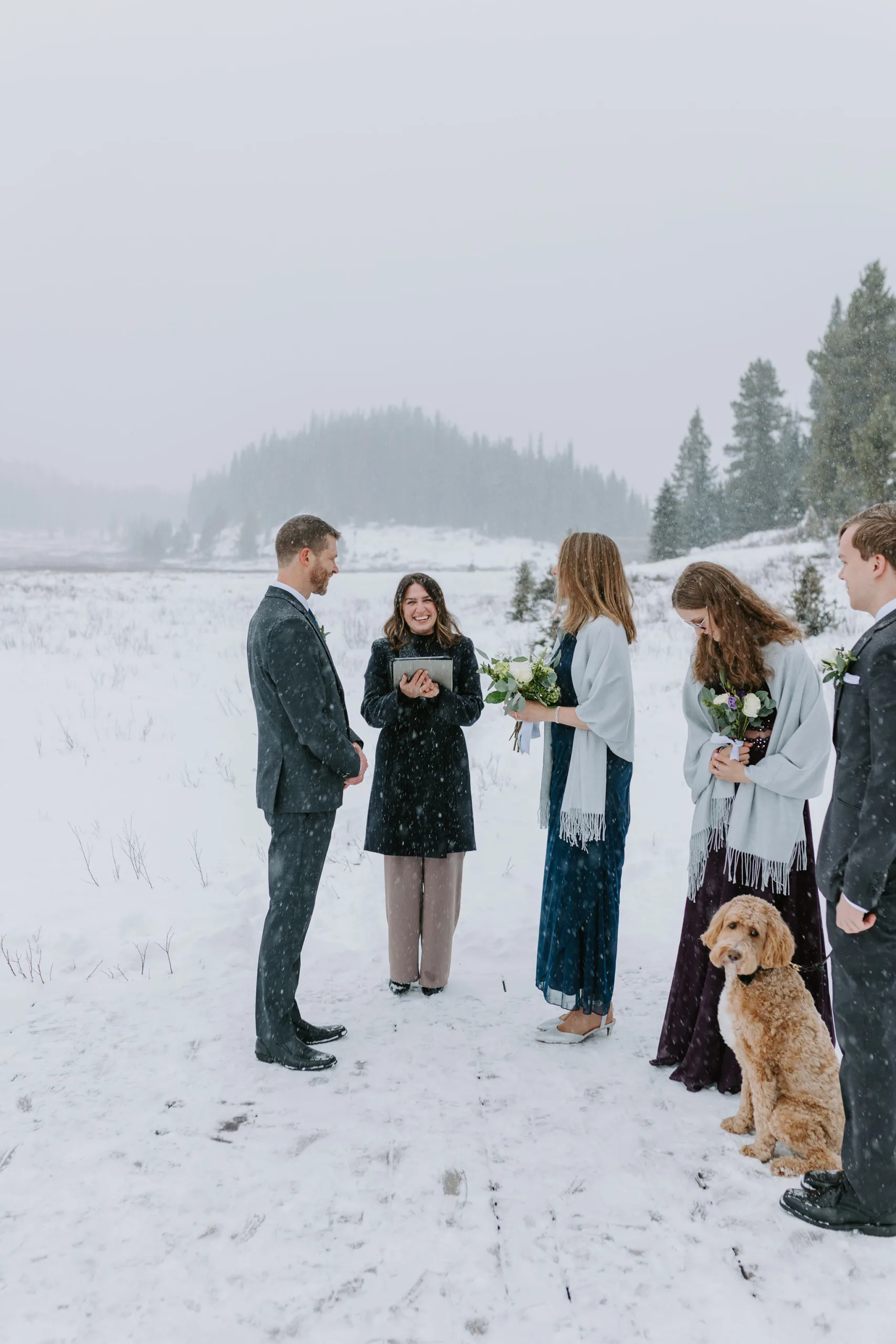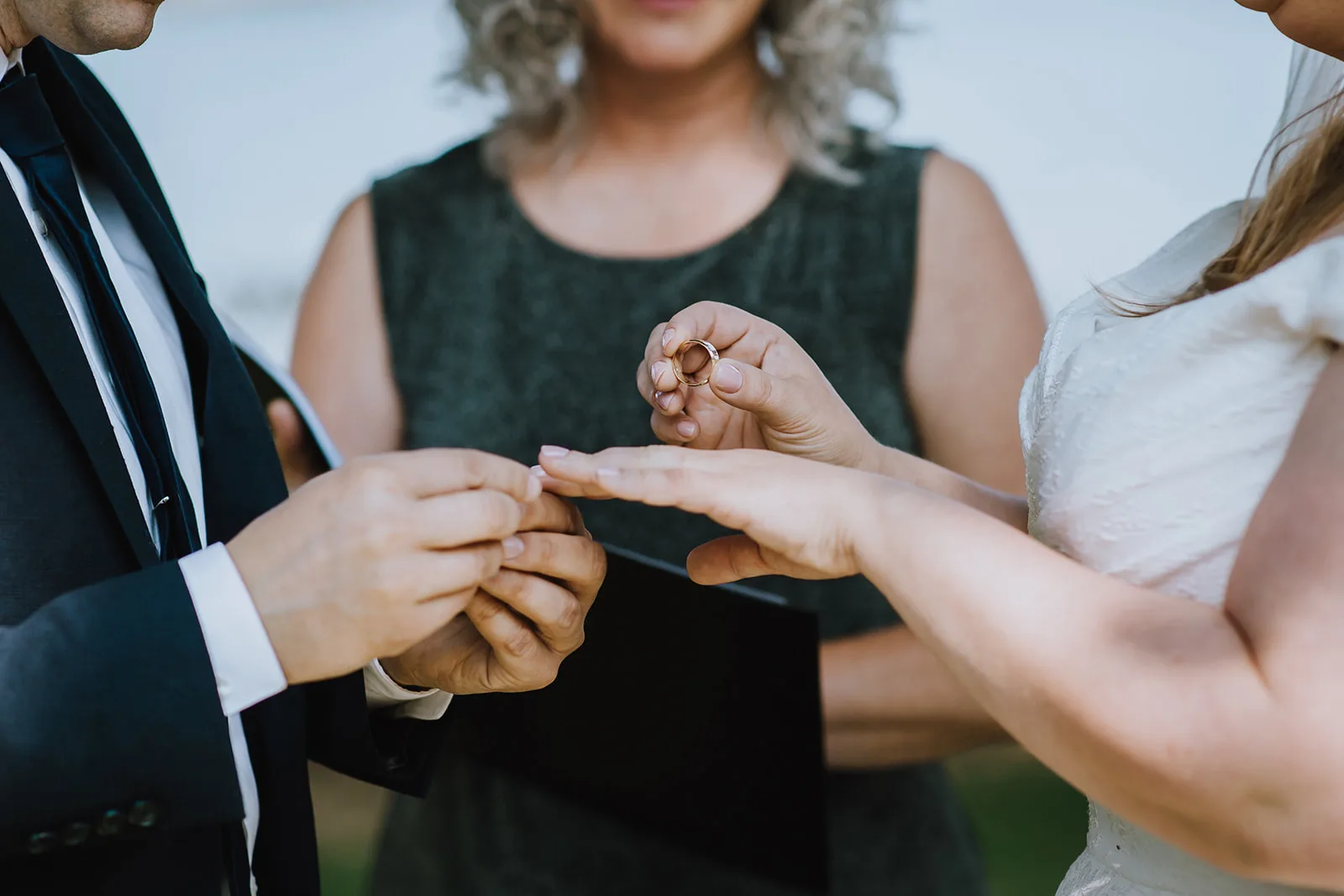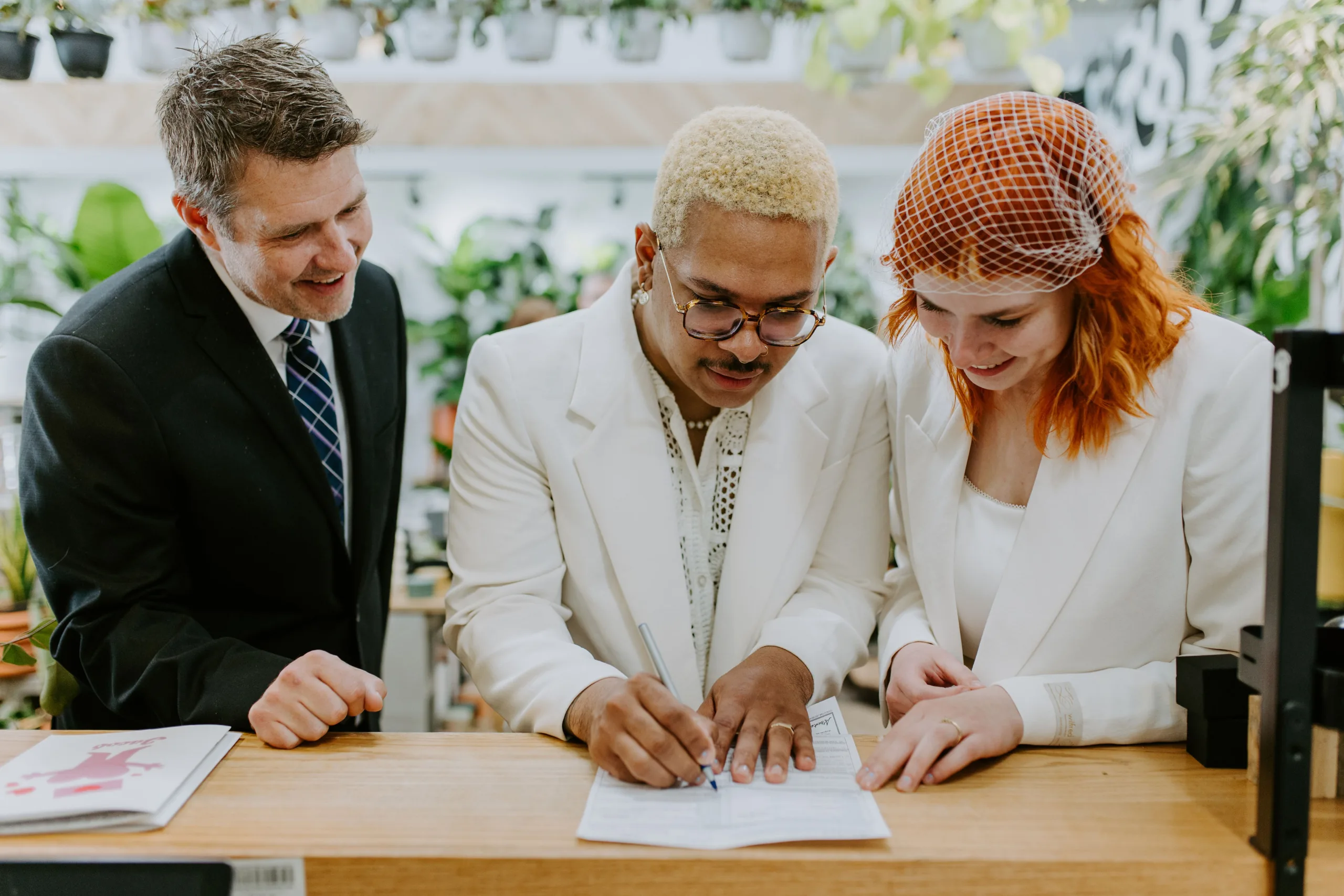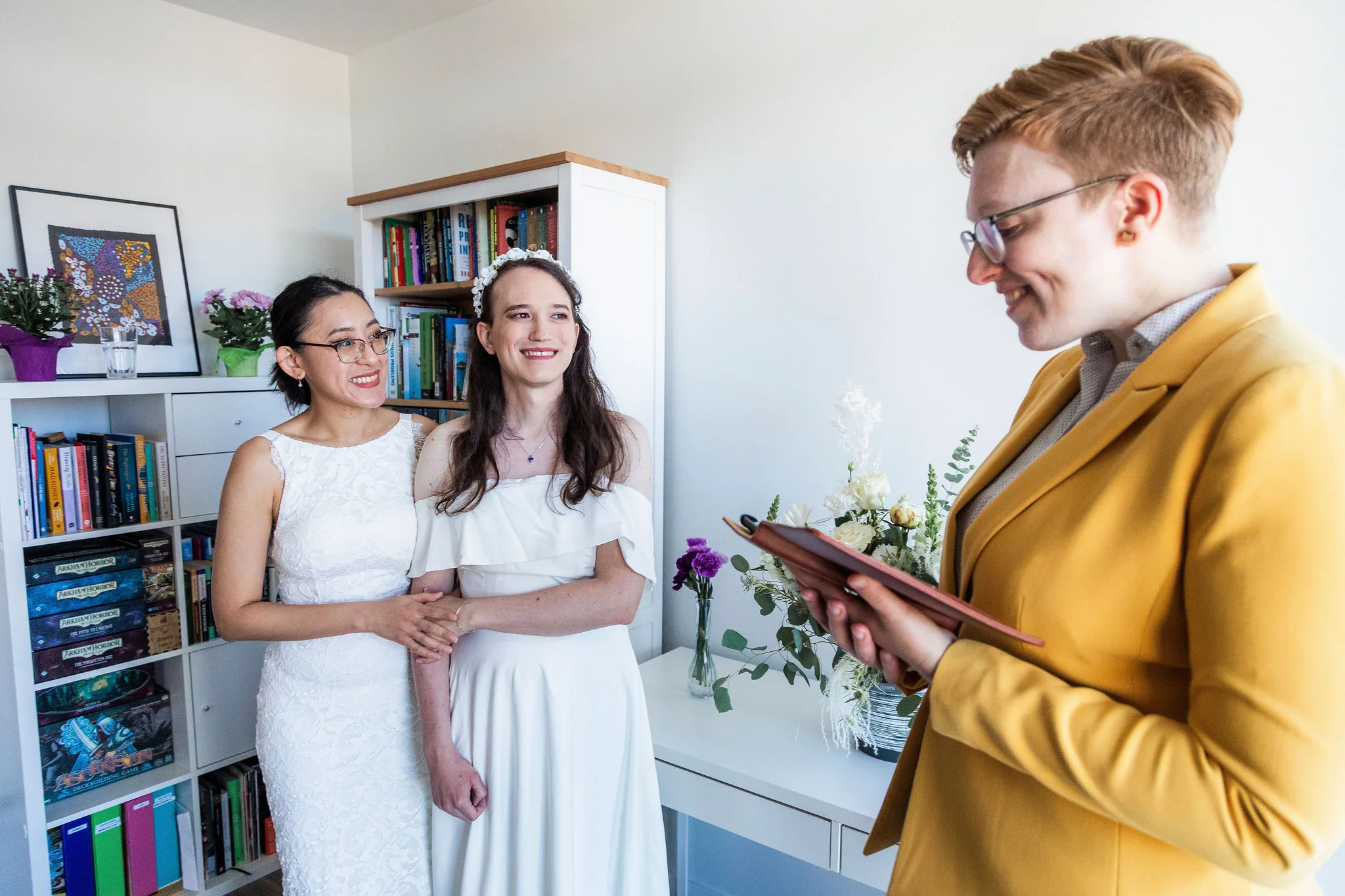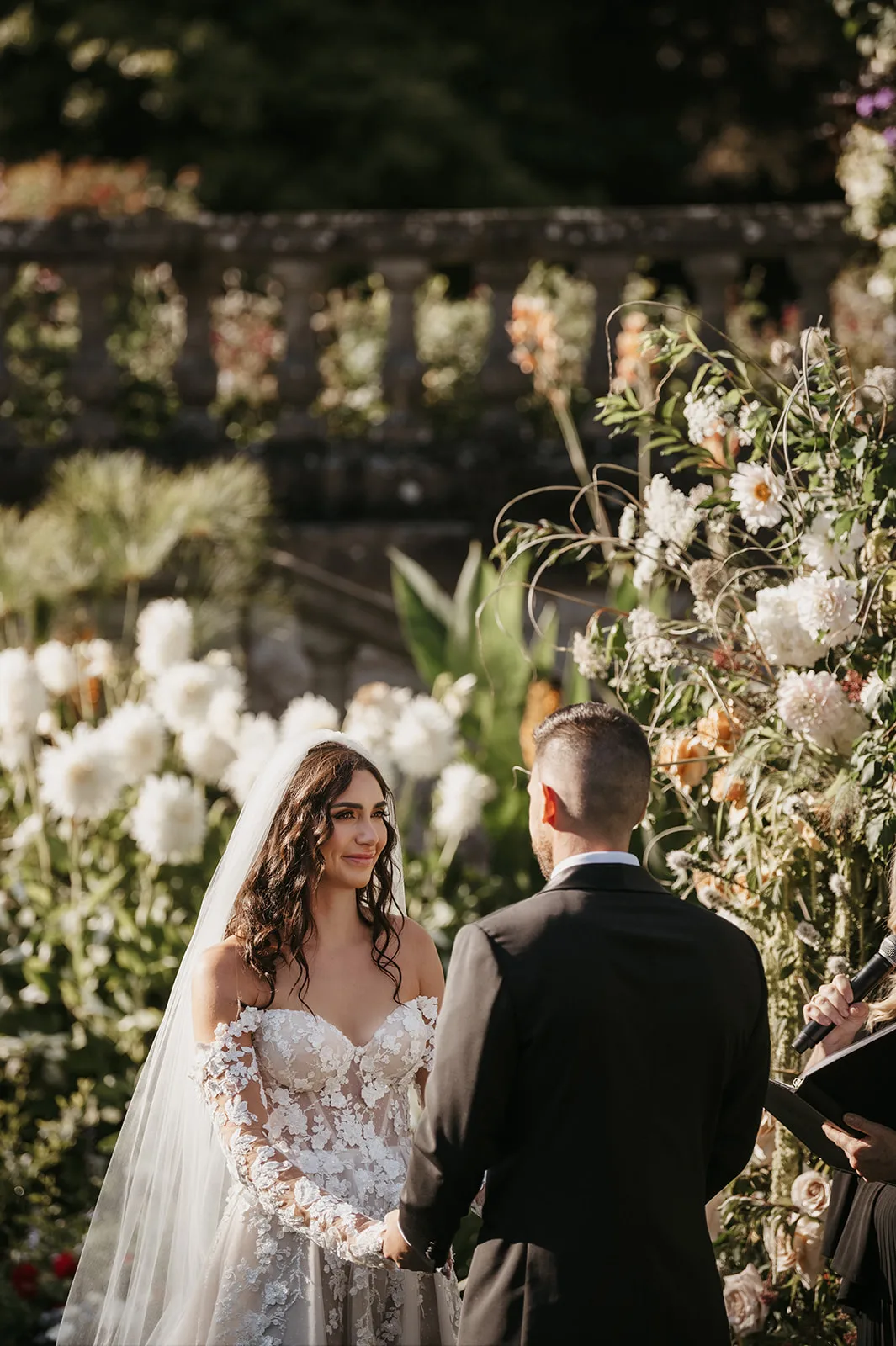Welcome to your ultimate wedding words glossary full of every word you need to know to plan and have the most amazing wedding ceremony!
As wedding officiants since 2010, we’ve helped thousands of couples put together their ceremonies. Many couples are doing this for the first time and understandably don’t know all the things there is to know about ceremonies. That’s where we come in!
Below we’re sharing 60 wedding words that might be relevant to your ceremony, plus quick definitions and full blog posts with more information. All of the wedding words below are in alphabetical order.
Happy ceremony planning!
1. Adventure Elopement Ceremony
Up first is one of our very own wedding words, Young Hip & Married’s Adventure Elopement Ceremony. This is one of our signature ceremony packages, perfect for couples who want to tie the knot in a unique and adventurous way.
Whether that’s in front of a waterfall, soaring above the clouds in a helicopter, or cruising around the coast in a floatplane, we can’t wait to help you plan the most memorable ceremony yet! All of our Adventure Elopements include your officiant and photographer, with videography as an optional add-on.
2. Announcement of the couple
One of the last things to happen at a wedding ceremony is the announcement of the couple. After the vows and rings are exchanged, and the first kiss has happened, your wedding officiant will announce you to your guests for the first time as a married couple. Everyone will cheer as you make your way back up the aisle.
If you’ll be using a new last name in your marriage, this announcement is usually the first time that name is said. Your officiant may say, “Let’s hear it for the newlyweds, Ms & Mx New Last Name!”
3. Backyard wedding
A backyard wedding is – pretty obviously – a wedding ceremony that takes place in your backyard. This is a great option for couples who want a more low-key and informal event with a smaller guest list. Bonus points if you (or one of your loved ones) has a beautiful backyard where you can host it.
You can choose to have your entire wedding in your backyard, or just the ceremony or reception.
4. Celebrant
A celebrant is the person who marries you during your wedding ceremony. This is usually another name for wedding officiant, and heard more often in the UK and Australia.
If you’re planning a legal wedding, make sure that your celebrant is a licensed officiant. Some celebrants do not have the power to conduct legal ceremonies and instead function in more of an MC or host role.
5. Ceremony music
It’s not just your reception and first dance that needs music, your ceremony may need some music too. You can choose songs for your entrance, ceremony exit songs and songs for all the important moments in between, such as when you’re signing your marriage licence.
Some couples also like to include songs that honour their traditions, cultures or religions throughout their ceremony. Check out our complete ceremony song list for more inspiration.
6. Ceremony script
Your ceremony script is the written version of your ceremony. It includes everything that will be said and done, acting like the blueprint for you, your officiant and your wedding planner.
We believe it’s very important that you see your ceremony script before your ceremony. Every word spoken and action taken during your ceremony should be something you approve of and that feels right for you two. You don’t want any bad surprises on the big day.
7. Ceremony signs
There are lots of wedding signs you can include at your ceremony based on what your guests need to know and how much you love a sign. For example, many couples like to have a welcome sign so guests know they’re in the right place when they arrive.
You may also want a sign letting your guests know your wedding is unplugged or encouraging them to grab a drink before the ceremony starts. Other popular signs include directional signage (where’s the bathroom?), decorative signs (such as a neon sign with your new married names), and remembrance signs (to honour past loved ones).
8. Ceremony toast
Who says toasts have to be saved for your reception? We say go ahead and raise your glass at your ceremony with a ceremony toast!
While less traditional, it can be fun to ask your guests to share in a toast and celebrate with you earlier in the wedding day. This is a fun way to make guests feel included and start your wedding on a celebratory note.
9. City hall wedding
City hall weddings are very popular, thanks to movies and TV shows, where running off to get married at City Hall seems romantic, whimsical and easy. But be warned that a city hall wedding isn’t always as easy as it seems. Many cities have special rules and may require you to book in advance or bring in your own officiant.
PS: Thinking of getting married at Vancouver City Hall? Check out our guide!
10. Commitment ceremony
A commitment ceremony is a ceremony where the couple makes a commitment to one another but without legally getting married. This ceremony can still include vows, rings and guests, but won’t include signing an official marriage licence.
Some couples will choose to have a commitment ceremony if they’re not able to get legally married, if they’re already legally married but want to celebrate their commitment, or if they’d simply prefer to make a non-legal commitment to one another.
11. Community vows
Community vows are vows spoken by your guests as they pledge their support for you and your marriage. These vows are usually led by your officiant who will read the vow out loud and ask your guests to all say “We do!” afterwards to show their commitment.
Having a community vow is a lovely way to involve your guests in your ceremony and your marriage. It’s also a nice way to really feel the love from your guests!
12. Custom & Creative Ceremony
The Custom & Creative Ceremony is Young Hip & Married’s most popular ceremony option. With this ceremony, you’ll get a completely unique and personal ceremony that’s 100% custom to you.
Your officiant will work with you to write and craft the ceremony of your dreams. They’ll interview your friends and family, help you write your vows, walk you through the different ceremony options and even lead your rehearsal.
13. Declaration of intent
The declaration of intent (or statement of intent) is the part of your ceremony where you declare your intent to marry your partner. Often this looks like your officiant asking, “Do you, YOUR NAME, take PARTNER’S NAME to be your spouse?” To which you will answer, “I do!”
Many people confuse wedding vows with the declaration of intent, but they’re actually two different things. We’ll get to vows later in this wedding words glossary!
14. Elopement
Elopements are some of our favourite kinds of ceremonies! An elopement is an intimate wedding, usually with no more than 20 guests, where the focus is solely on the couple. There’s no pomp and circumstance – picture a few of your loved ones standing around you in a beautiful setting as you say your vows.
Elopements, while more casual and shorter than full-scale wedding ceremonies, are often some of the most emotional ceremonies we get to be a part of.
15. First kiss
While likely not your first kiss ever, your first kiss as a married couple is still a pretty freaking big deal.
The kiss usually comes towards the end of your ceremony, after your vows and rings have been exchanged. Your officiant will pronounce you married and invite you to seal the deal with a kiss.
16. Flower girl & ring bearer
You probably know that the flower girl and ring bearer are roles usually held by kids in the wedding party. But did you know you can totally flip the flower girl and ring bearer tradition on its head?
First of all, these roles are optional. If you don’t have any close kids in your life, you can skip the hassle of asking your second cousin’s twins to try and walk down the aisle without crying.
Second, you can ask adults to fulfil the roles instead. Who doesn’t love a Flower Granny? Or third, you can rename the roles to make them more inclusive for people of all ages and genders!
17. Friendor
A friendor is a friend who is also serving as one of your wedding vendors. And in our experience, it’s not a good idea to hire friendors for your wedding!
Working with a friend may mean you get a discount, but it doesn’t mean you’re working with a professional. You may be uncomfortable giving them feedback or, worse, asking for a refund if they don’t deliver. Plus, if your friends are busy working, they don’t get to enjoy your wedding.
18. Giving away the bride
Traditionally, a bride was given away by her father to her waiting groom. This signified the transfer of a woman from her father’s property to her husband’s property. If that makes you gag, you’ll be happy to know there are lots of alternatives to giving away the bride!
We encourage you to change up this tradition in a way that works best for you and respects what you value. Plus, with some weddings not having brides or fathers involved, it’s time we leave this outdated tradition behind anyway.
19. Guest list
Your guest list is the list of people you will be inviting to attend your wedding. Putting together your ceremony guest list can be quite stressful as you’ll need to see how many people fit into your venue, decide if plus ones or children are invited, check how far your wedding budget will stretch, and maybe put together a B list for people who may not get invited.
The guest list is a puzzle, but we know you’ll solve it. To help, check out our post on cutting down your guest list.
20. Handfasting
Handfasting is an old Celtic tradition where ropes are tied around a couple’s joined hands to symbolize their commitment. It’s where we got the term “tying the knot” from.
These days, many couples like to include handfasting in their ceremony. You can personalize your handfasting ritual by using special ropes or cords, such as ones in your wedding colours, or by saying special vows as you complete the ritual.
21. Helicopter elopement
A part of our Adventure Elopement package, Young Hip & Married is thrilled to offer helicopter elopements to couples getting married with us in Vancouver and Whistler. Get ready to take your love to new heights – literally!
Your helicopter elopement package includes the helicopter flight, your officiant and photographer, and optional add-ons like guests and videography. Check out our Adventure Elopement page to learn more!
22. Home wedding
A home wedding is, quite simply, a wedding you host in your own home. This could be a backyard wedding or it could be saying your vows in your living room with a few loved ones watching from the couch.
At-home weddings are usually more casual but extremely special celebrations. It can be very meaningful for couples to solidify their commitment to one another in their own home. Plus, they’re budget-friendly too!
23. House announcements
House announcements are a type of wedding ceremony announcement that your officiant will make at the top of the ceremony. Before the processional, your officiant will get all of your guests’ attention and share a few housekeeping notes.
These announcements usually include things such as instructions for where your guests should go after the ceremony, any safety or venue-specific information, and a reminder of your photo and phone policy.
24. Intimate Elopement Ceremony
Young Hip & Married’s Intimate Elopement Ceremony is perfect for couples who want a no frills way to get married. You don’t need an aisle walk or fancy decor – just the two of you and maybe a few guests for a “gather and wed” style ceremony.
We’ve been lucky enough to marry eloping couples in some of the most beautiful places. Check out some of our favourite elopement locations in Vancouver, on Vancouver Island and in Calgary.
25. Intimate Elopement + Photography Ceremony
Just like our Intimate Elopement Ceremony, but this time we’re throwing in the photographer. With our Intimate Elopement + Photography Ceremony, you’ll have everything you need for the perfect small-scale celebration, plus the photos to remember it forever.
This is the perfect package for couples who want to keep things simple, but beautiful. It’s also a great option for couples who plan destination weddings in our locations, as you only need to book one vendor (us!) and we’ll have everything you need to tie the knot.
26. Justice of the Peace
A Justice of the Peace is a judicial officer who serves as the public’s first point of contact with the legal system. They’re responsible for things like setting bail terms and court dates and in some jurisdictions, they can perform legal weddings.
Note that JPs cannot perform weddings in all provinces/states. So be sure to check in with the rules in your specific area before making any plans to have a Justice of the Peace officiate for you.
27. Legal wedding
A legal wedding is a wedding ceremony that results in a couple becoming legally married. This requires them to complete any mandatory actions, such as consenting to marriage in front of two witnesses, and signing the official paperwork.
A legal wedding ceremony must be presided over by someone who is licensed and legally able to marry couples and file their paperwork.
28. Marriage certificate
A marriage certificate is the piece of paper you get after your wedding that certifies that you are married. Once your licence has been filed and registered, you will receive or can apply for your marriage certificate.
Note that some jurisdictions will automatically send you your marriage certificate while others require you to apply for it and pay a fee.
29. Marriage commissioner
A marriage commissioner is a government representative who can legally officiate weddings. They may sound similar to a wedding officiant but there are some crucial differences between officiants and commissioners.
Most notably, commissioners must be semi-retired and can only marry couples within their limited geographic area. They charge a set fee and are usually more limited in the types of ceremonies they can write and perform.
30. Marriage licence
Your marriage licence is the piece of paper you will sign at your ceremony to become legally wed. You’ll apply for your licence in the weeks or months leading up to your wedding, sign it on the big day, and then your officiant will file it with the appropriate body so your marriage is legally recognized.
We have lots of resources to help you obtain and sign your BC marriage licence, Alberta marriage licence or Ontario marriage licence.
31. Micro wedding
A micro wedding – which became very popular during the pandemic – is in between a full-sized wedding and an elopement. Micro weddings usually have no more than 50 guests but still include many of the elements you’d expect to see in a full-sized wedding.
While most common during the pandemic when larger celebrations weren’t possible, micro weddings are still going strong today. Many couples like the idea of celebrating with a smaller group (and saving a bit of money!).
32. Non-denominational ceremony
A non-denominational ceremony is ideal for couples who want a meaningful moment without being tied to any religious institution. Depending on your preferences, this ceremony can still be religious or spiritual, but doesn’t need to align with any specific denomination.
All of our wedding officiants at Young Hip & Married are happy to offer non-denominational or non-religious ceremonies. If you do want to involve your religious, spiritual, cultural or traditional practices, our officiants can also work with you to help incorporate those things into your ceremony.
33. Officiant
Welcome, you’ve found us! A wedding officiant is the person who leads your ceremony and is legally able to marry you. Wedding officiants are not government officials, and therefore have more freedom around the types of ceremonies they can perform. However, they are still licensed and can legally marry couples.
To learn more we can fill you in on what an officiant does, what an officiant says, what an officiant wears, how to find an officiant, how to choose an officiant, and answer any other questions you have about officiants!
34. Processional
The processional, or aisle walk, is how the couple and (optionally) their wedding party enter the ceremony. This is usually set to music and marks the official start of the ceremony.
You can choose a traditional processional order, often with a bride entering last with their father, or mix things up with a unique processional that feels best for you.
35. Program
A wedding program is a pamphlet that is given out to guests as they enter the ceremony. It usually lists members of the wedding party, shares the outline of the ceremony, and includes any special things guests need to know, like the lyrics to a song they have to sing or translation to a part of the ceremony that won’t be in their native language.
36. Pronouncement
The pronouncement is the part of the ceremony when your officiant announces you as a married couple. This is usually followed by an invitation to share your first kiss and deafening applause by your guests!
The traditional pronouncement (“I now pronounce you man and wife. You may kiss the bride.”) doesn’t work for all couples or resonate with their beliefs. Instead, check out some pronouncements alternatives to make this moment your own.
37. Rain plan
If you’re planning on an outdoor wedding ceremony, you’re going to want to have a rain plan. A rain plan is just what it sounds like – a plan in case it rains (or snows, sleets, hails, turns into a hurricane, etc.). Cross your fingers for sun but chat with your wedding planner and/or venue coordinator about what you’ll do if the weather isn’t cooperating.
If you’re getting married in a notoriously rainy place like Vancouver, you’ll definitely need a good rain plan. Check out our favourite rainy day elopement locations in Vancouver and our picks for a last minute Vancouver rain plan.
38. Readings
An optional element you can add to your wedding ceremony is a reading. This is when you ask an honoured guest to come to the front and read a pre-selected text to your guests. This can be a great way to involve a loved one in your ceremony and share some special words that mean a lot to you two.
We have lots of readings to help inspire your choice – including readings from TV shows and readings from songs. Start with our post on how to choose a reading and our top 10 readings. Plus, pass on our best tips for your readers!
39. Recessional
The recessional is the opposite of the processional; this is when you two and your wedding party walk back up the aisle and exit your ceremony after it’s over.
The recessional is usually a lot less formal than the processional and is often accompanied by a fun exit song.
40. Rehearsal
Contrary to popular belief, your wedding rehearsal isn’t all about the rehearsal dinner. The actual rehearsal is important too! This is when you two, your wedding party and a few vendors (usually your officiant and planner) walk through your ceremony. Everyone learns where to go, what to do and what to expect for the big day.
In our opinion, a rehearsal is pretty important and can help you feel a lot less nervous going into your ceremony. Check out our wedding rehearsal checklist and rehearsal FAQs for all of our best tips!
41. Ring exchange
The ring exchange is the part of the ceremony when you two – you guessed it – exchange rings! This is usually done after your vows to solidify the promises you just made to one another.
Learn all about rings for weddings here!
42. Ring statement
A ring statement is the words you say during your ring exchange. This usually looks like holding your partner’s hand and repeating words after your officiant while you place the ring on their finger.
Your ring statement can be as simple as, “With this ring, I thee wed.” For other options, check out our favourite words for your ring exchange!
43. Runway Elopement Ceremony
One of our newest ceremony packages is the Runway Elopement Ceremony. This incredible package includes a beautiful hotel suite at Fairmont Vancouver Airport, parking, your officiant, your photographer, a luxurious dinner for two and breakfast the next morning.
44. Sand ceremony
A sand ceremony is a type of unity ceremony that some couples like to add to their wedding day. In this ceremony, each member of the couple will pour different coloured sand into a container. The two colours will mix, symbolizing two people coming together as one.
Not only is a sand ceremony a fun addition to your ceremony, but it can also make a nice keepsake. You can display the sand in a vase or even have it turned into glass!
45. Signing ceremony
A signing ceremony is a type of wedding ceremony where the main focus is signing the marriage licence to legalize the wedding. Any legal requirements to be married, such as verbally consenting to enter into marriage with one another, would also need to be completed in front of a licensed officiant and two witnesses.
This type of ceremony is often done if a couple is planning a larger non-legal ceremony (i.e. commitment ceremony) for a later date but wants to get the legal ceremony (i.e. signing ceremony) completed ahead of time.
For example, if a couple is planning a destination wedding in Aruba, they may choose to sign their paperwork at home before they go.
46. Signing table
A signing table is the table where you go to sign your marriage licence either during or right after your ceremony. Your licence will be signed by you two, your officiant and your two witnesses.
These tables can be personalized and decorated with flowers and candles, they can be unique – such as using an antique desk instead of a table, or they can even be informal, such as signing your licence on top of the bar!
47. Sweet & Simple Ceremony
Young Hip & Married’s Sweet and Simple Ceremony is perfect for couples who are having a full-length wedding but who don’t want as many custom elements. You have more than 20 guests, but you’re okay to skip out on a little personalization.
The Sweet & Simple does not include a personalized ceremony script nor does it include a rehearsal. (If you want those things, check out our Custom & Creative Ceremony instead!)
48. Timeline
A ceremony timeline can actually refer to two things – 1) the timeline for planning out your ceremony, from the moment you get engaged until you walk down the aisle, or 2) the timeline for your ceremony, as in the order of events. Both timelines are important!
Once you’ve got your ceremony planning timeline in order, you can move on to putting together your ceremony outline and ceremony script. Don’t forget to utilize your officiant as your ceremony expert!
49. Unity candle
A unity candle is a type of unity ceremony that couples can choose to add to their wedding. In this tradition, both members of the couple will hold individual candles which they will then use to light one larger candle together.
You can also include loved ones in the tradition, such as asking honoured guests to bring up the individual candles to you before you light the unity candle.
50. Unity ceremony
We’ve already talked about unity candles and sand ceremonies as two popular types of unity traditions. But did you know there are lots of other unity ceremonies you can choose from? From beer blending to tree planting, there’s something for every type of couple!
Unity ceremonies are not mandatory, but they can be a nice addition to your wedding ceremony and a good way to symbolize your commitment. Many ceremonies also leave you with a keepsake that you can take home after the ceremony.
51. Unplugged ceremony
An unplugged ceremony is a ceremony where guests are asked to put away their phones, cameras and tablets. We love unplugged ceremonies for a few reasons:
- Your guests get to focus on the beautiful ceremony in front of them instead of being distracted by their devices
- Your photographer gets clean shots without a bunch of screens in the way
- And you two get to see smiling faces instead of the backs of phones!
52. Virtual wedding ceremony
Virtual weddings were all the rage during the pandemic when no one could gather in person, but there’s still lots of good reasons to have virtual wedding ceremonies in a post-pandemic age.
Virtual ceremonies – where some or all guests join the ceremony by live stream instead of in-person – can help couples save money and can help guests attend weddings they otherwise may not have been able to attend.
53. Vows
Weddings vows are the promises you make to your partner for the marriage you want to have together. These are the heartbeat of your wedding ceremony and words we hope you look back on over the long years of your marriage.
We’re passionate about wedding vows and have lots of resources to help you choose or write your own. Whether you’re looking for modern vows, traditional vows, simple vows, funny vows, repeating vows or you want to write your own vows, we’ve got you covered.
We even have a FREE vow guide – check it out!
54. Vow books
Vow books are small booklets where you write or print your vows to read from during your ceremony. While you can simply write your vows or print them out on a piece of paper, many couples prefer vow books.
Not only do these look great in photos, but they also make lovely keepsakes for after the wedding. You can even get your vow books personalized with your names, wedding date and favourite colours.
55. Vow renewal
A vow renewal is a ceremony for a couple who is already married but wants to recommit to one another. This is not a legal ceremony, since the couple is already legally married, but rather a symbolic commitment ceremony.
We love the idea of having a vow renewal to mark a big occasion (such as a milestone anniversary), life change, reconciliation or simply because you still love each other and want the world to know. Check out some great vow renewal examples here.
56. Wedding party
Your wedding party – also commonly called a bridal party – is the group of people who join you on your special day. During the ceremony, your wedding party often walks down the aisle with you and stands next to you at the front.
However, these things are optional! You can have a wedding party (or skip the wedding party altogether) who still hang out with you, get ready with you and take photos with you, but they don’t have to do an aisle walk or stand at the front of your ceremony.
57. Wedding prayer
For religious couples, adding wedding prayers or blessings into their ceremony can be very important. These prayers can represent any religion (or culture or tradition) and can be recited by you two, all of your guests, your officiant or an honoured speaker.
Check out our guide for adding wedding prayers into your ceremony.
58. Wedding website
Your wedding website is where guests will learn all about your wedding, see beautiful photos of you and maybe even RSVP. It also has some essential details for your ceremony, such as the ceremony date, time and location.
Your Our Story section on your wedding website can also be a big help for your ceremony. It can inspire your ceremony script and allow your guests to feel more connected to you two before you share your vows.
59. Witness
In order to have a legal wedding ceremony in many jurisdictions, that ceremony must be observed by two witnesses. Those same two witnesses must sign and date your marriage licence. Choosing someone to be your witness and sign your licence can be a great way to honour a loved one.
PS: Planning on an elopement or destination wedding without any guests? Reach out and we’ll help you find witnesses to make your marriage legal!
60. Words of welcome
The words of welcome are spoken by your officiant after your processional and once all of your guests are seated. During this part of your ceremony, your officiant will welcome you and your guests, optionally share a land acknowledgement, and set the tone for the rest of your ceremony.
Wrapping up your wedding words
Whew, you’ve made it through all 60 wedding words for your ceremony! Now that you have the vocabulary to feel a lot more confident planning your ceremony, we hope you’re inspired and empowered to craft the ceremony of your dreams.
Don’t forget, your wedding officiant is your ceremony expert. They can lead you through every element of your ceremony and help you make choices that personalize the experience for you two.
Meet our officiants, check out our ceremony packages and get in touch to book today!
